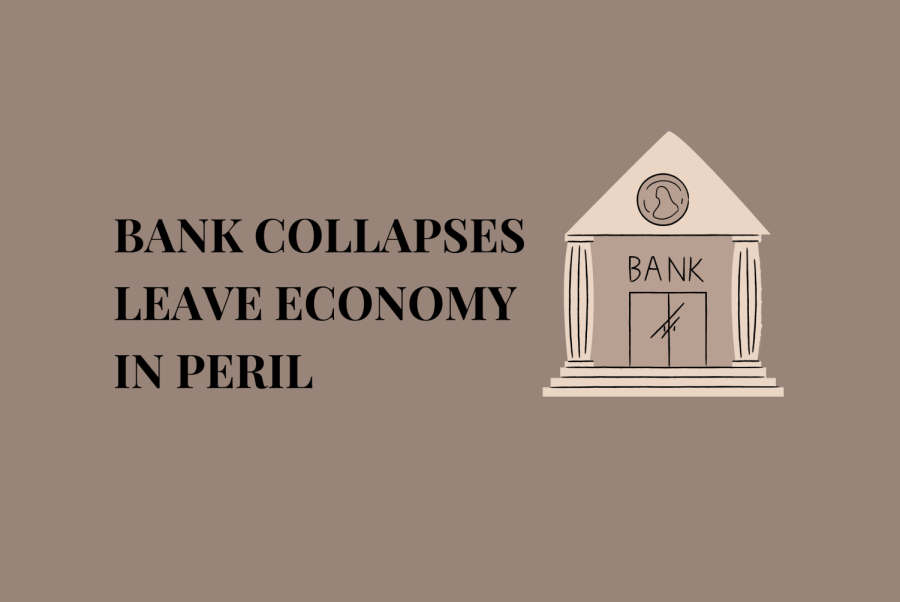Bank collapses leave economy in peril
May 23, 2023
This previously ran in our April 2023 print issue.
Throughout history, the stability of the economy has relied upon banks. After all, almost everyone holds their money in them – but when these banks fail, the economy plummets and many people are left with massive losses.
In March, two major banks announced their failures within two days of each other. Silicon Valley Bank, located in California, declared failure on March 10. (Holding over $209 billion in assets, many investors were left with absolutely nothing.) Two days later, New York’s Signature Bank announced that they had failed as well due to mass withdrawals by customers who feared that their own money was in danger due to Silicon Valley Bank’s collapse. Signature Bank’s deposits amounted to almost $111 billion. This means that over the span of three days, people who kept their money in those two banks lost a total of $320 billion.
During the recession of 2008, United States households lost a total of $19 trillion. The failure of banks typically heralds an economic crash, the duration of which depends upon the recuperative actions of the government. If the government takes the proper steps, the damage to infrastructure and instability of the economy can be minimized. However, if the government does not take action correctly, the failure of banks will snowball into a nationwide recession.
Thankfully, the Federal Deposit Insurance Corporation (FDIC) has promised that all of the deposits will be fully refunded, bypassing the standard limit placed upon the money investors can get back through federal insurance. At first, this sounds like our government is responding properly, right? Well, to some extent, yes – but the truth is that the government is also somewhat responsible for the crash of these institutions.
You may have seen headlines on the news mentioning the government raising interest rates. Basically, the government raises interest rates in order to try to reduce inflation. Sometimes this works, and causes inflation to slow down, but it increases the risk of recessions. Increased interest rates also lead to a devaluation of older government bonds and a reduction or even stagnation of economic growth. In the past 12 months, the U.S. has raised interest rates nine times. It seems to me that the government has been focusing too much on inflation, while disregarding the ripple effects on the stability of the economy.
Silicon Valley Bank’s downfall was due to their heavy investment in government bonds. They heavily invested in Held-To-Maturity bonds around a year ago, meaning they couldn’t access or sell the bonds until a certain predetermined date they had agreed upon with the government. By the time Silicon Valley Bank could sell the bonds, they had lost a staggering amount and were forced to vend them at a financial loss. When the people with money in Silicon Valley Bank heard about this, they rushed to withdraw all of their money, leaving the bank unable to give them what they were owed.
Signature Bank folded due to similar conditions, except they had invested in cryptocurrency instead of government bonds. While cryptocurrency saw a massive spike in value around two years ago, its price has drastically plummeted since then. This meant that Signature Bank faced a similar problem as Silicon Valley Bank, as they had lost much of their clients’ deposit money. When their customers heard of Silicon Valley Bank’s collapse, they rushed to withdraw their money as well, but because of Signature Bank’s losses in the cryptomarket they were unable to provide the funds.
I give credit to the FDIC for attempting to make up for their error, but they should be more careful with their priorities before it comes to this. Keeping inflation rates low is important, but not as important as preventing bank failures.
Also, there should be closer monitoring of banks’ investments in order to prevent unwise decisions like that of Silicon Valley Bank.
While the FDIC is doing damage control to rectify the situation that has already been caused, the government as a whole appears to have learned absolutely nothing.
As of March 22, the Federal Reserve voted to increase interest rates by 0.25 percent. Increasing the interest rate further destabilizes the financial sector. To continue increasing interest rates after two major banks collapsed is not only foolhardy; it is downright dangerous. In 2008, the folding of the Lehman Brothers Bank caused the loss of $639 billion, almost double the total amount lost by the closure of Silicon Valley Bank and Signature Bank. I am not saying that we will face a recession on the level of 2008 yet, but if the government continues to ignore the causes of these closures and keeps hiking up interest rates, who knows what the future holds.
Continuing to focus solely on keeping inflation down, without considering the effect on the economy’s stability, is like trying to fix a leak in your roof as a tsunami is coming.











